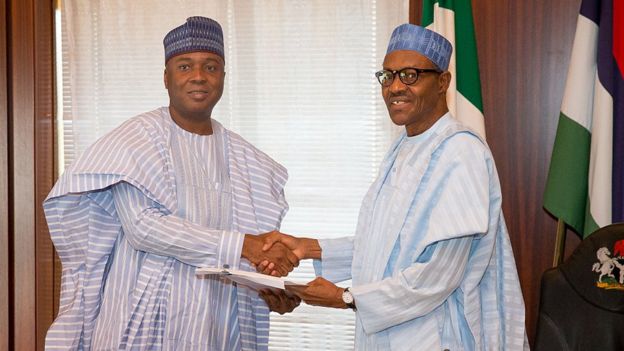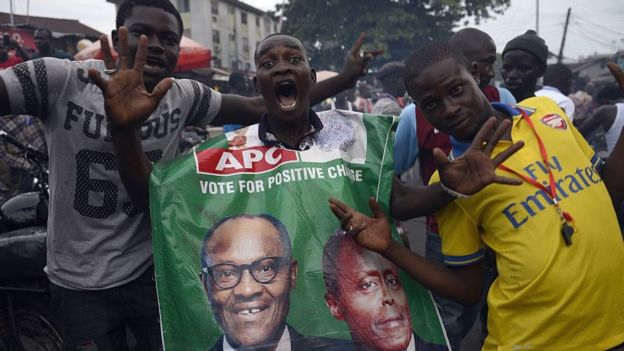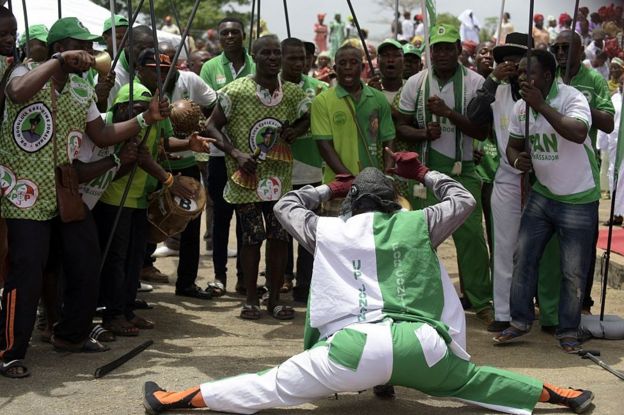
In our series of letters from African journalists, editor-in-chief of Nigeria's Daily Trust newspaper Mannir Dan Ali considers President Muhammadu Buhari's chances of re-election after the loss of key allies.
The dramatic defections of nearly 50 legislators last week from Nigeria's ruling party looked for a moment like history was repeating itself.
There had been hints for weeks that defections were on the cards.
Key members of President Muhammadu Buhari's All Progressive Congress (APC) party, who were aggrieved by his leadership, wanted to deal a powerful body blow in the run-up to next year's polls.
A similar strategy had weakened the People's Democratic Party (PDP) when it was in power, leading to its defeat in the 2015 elections.
However, when the defections finally happened, they were not as seismic as in 2015 when five influential state governors and at least two political kingmakers opened the floodgates for others to follow.

Senate President Bukola Saraki (L) is said to be behind President Buhari's (R) troubles
So far around four dozen members of the national assembly have switched sides from the APC mainly to the opposition PDP.
The governor of the north-central state of Benue has also defected and at least two other governors may follow.
Interestingly, the leaders of both the lower and upper houses of the national assembly, Yakubu Dogara and Bukola Saraki respectively, have not announced their defection - despite the fact that they were seen as the instigators of the current crisis.
But they are both now viewed with suspicion - and there are calls for them to be expelled from the party so that their positions could be taken by core APC loyalists.
"Mr Buhari has been unable to put a lid on the competing ambitions within the party - as some governors and their political backers try to gain the upper hand with an eye to the presidency in 2024"
It is no secret that Mr Saraki does not see eye-to-eye with the president. He has just been cleared by the Supreme Court of corruption following an investigation initiated by Mr Buhari.
Their tense relationship has meant that many important laws and appointments are being held up by parliament.
Such delays are only going to worsen as both houses of parliament went into an abrupt eight-week recess immediately after the defections.
Among the business now in limbo is one for the approval of money for the electoral commission to conduct the February 2019 election.

Mr Buhari came to office amid great euphoria but many feel he has not met their expectations
And with party primaries due in the next few weeks, more turbulence is expected.
The defectors have one thing on their minds - they want to secure their own political futures.
They had figured out they were unlikely to secure nomination for the posts they were gunning for. Their key demand was an automatic ticket to run in the next election, but the APC refused.
Many of them had joined the APC from the PDP, and feel their loyalty has not been rewarded.
But Mr Buhari has been unable to put a lid on the competing ambitions within the party - as some governors and their political backers try to gain the upper hand with an eye to the presidency in 2024.
Since the return to civilian rule in 1999, it is the powerful state governors who tend to have the most influence in their parties.
Members of parliament just do not carry as much weight - and as consequence suffer from a high attrition rate, with only between 20 and 30% of them securing a second term.
Despite these defections, the ruling party has said it is not worried as it still has a majority in both houses.
This was exactly the position taken by the PDP before it went on to stare defeat in the face in 2015.

The PDP was defeated in 2015 after 16 years in power
For President Buhari and the APC to avoid a similar fate, they will need to do more to reassure their members and other Nigerians that they can be trusted with power beyond 2019.
The president's patchy performance has meant that many Nigerians are not as enthused about the coming election as they were in 2015.
Then they were full of hope. A Buhari presidency promised a tough stance on corruption, insecurity and to revitalise the economy.
President Buhari has had limited success in the first two and the economy has worsened with unemployment at an all-time high.
The only reason the president and his party may just win next February is that the opposition has yet to put up a credible alternative.
There are also Nigerians who are unlikely to be able to bring themselves to vote for the PDP, blamed for creating a lot of the mess during its 16 years in power.
With party primaries scheduled to take place between August and October, it is getting very late in the day for the opposition to find someone with the credibility and national name recognition to appeal to most Nigerians and the big power brokers who are a big factor in the elections.